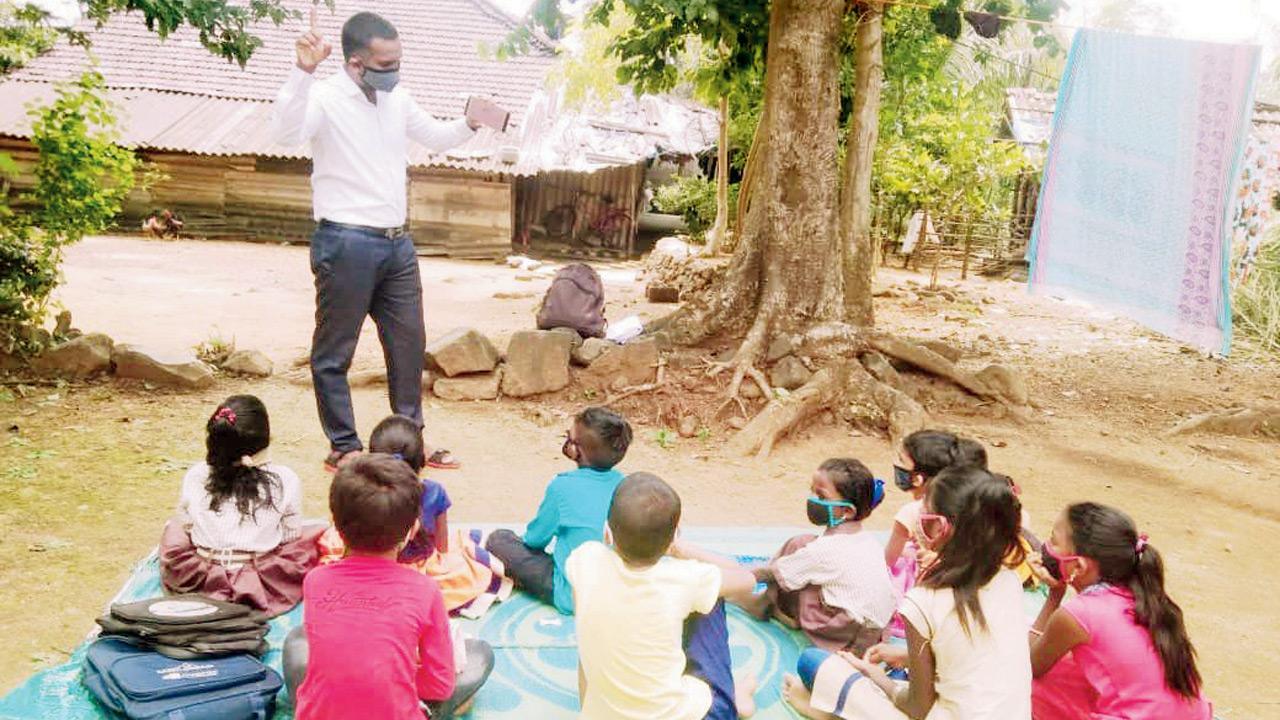As the new academic year resumes in its online avatar again, a book called In Crises, We Persist salutes 15 schoolteachers who ensured students in rural Maharashtra continued their studies despite the pandemic

Pinesh Jadhav with his students
In Akloli village, 12 km away from his students in Musarane, Palghar, teacher Pinesh Jadhav had to find ways to improvise and make learning accessible as schools shifted online during the pandemic. He noticed that a few of his students, from scheduled tribe communities, owned feature phones. And so he began classes over speakerphone, narrating lessons in the form of stories to an attentive audience of a few children gathered in one house. In this audio-only format, his classes began at 8 pm, when most parents’ mobile phones would be available for their children (students) to use.
ADVERTISEMENT
Illustrations by Ananya Pareekh feature in the book
Jadhav’s efforts, along with 14 other teachers’, have been chronicled in a new book, In Crises, We Persist by Centre for Equity and Quality in Universal Education or CEQUE [pronounced as ‘see-khey; Hindi for ‘to learn’].
CEQUE’s work highlights the role of the teacher. The Mumbai-based NGO works with teachers of government and low-income private schools to establish better pedagogic practices. Anju Saigal, founder and executive director of CEQUE, mentions in their annual report, “We envision a world where every child receives the education s/he deserves.” Through their Teacher Innovator Programme (TIP), which selects candidates on the basis of application, teachers can learn new skills, put them into practice and relate their findings. TIP currently works with 300 teachers across six districts in Maharashtra. While the programme’s fellows continued their training online during the pandemic, they were not able to reach their students due to issues with connectivity or lack of devices.
Chatura Rao
Surveying the situation and understanding individual needs closely, the teachers came up with unique and fun ways for learning to continue despite the obstacles. They arranged makeshift schools, found resources, organised students to convene at a certain time and involved community members and parents too.
Bringing to light ways in which teachers have gone beyond their duty, Uma Kogekar, CEO of CEQUE, notes that their role is one that is severely under-appreciated. She continues, “It was their efforts that we wanted to capture in the form of a book.” Kogekar tells us that along with online schooling, teachers were given Covid-19 duties such as manning a centre, distributing rations, and conducting government surveys.
Chatura Rao, one of the five writers of the book that took six months to create, notes that along with teaching duties, these teachers have provided support and counselling to their students during this time. Rao, who worked with CEQUE as a communication specialist, says, “It’s important to not ignore the things happening in the world and understand that learning has to accommodate them. All the teachers that we wrote about did that.”
Jadhav recalls his favourite interaction with his students, “One evening, I called on a parent’s mobile phone to tell the children a story. One by one, the students began to show up. I asked, ‘Who all have come?’ And the students who were seated, replied, ‘Yes, sir, yes, sir,’ via the mobile speaker. They felt as if it was a regular school day in the morning. I became very emotional because despite the situation we made it to ‘school’ and had attendance.”
Log on to: ceque.org to
Get a copy of the book
 Subscribe today by clicking the link and stay updated with the latest news!" Click here!
Subscribe today by clicking the link and stay updated with the latest news!" Click here!






